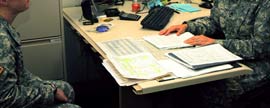First, congratulations on your assignment in Korea! I served two years there and enjoyed by time there, but in all fairness I was able to see my family most weekends so I did not face the same challenges and pains as many of our Soldiers. I fully understand where you are coming from and most likely understand what your chain of command is trying to achieve.
Typically, generally, usually this would be inappropriate. There are times when individuals might need some tightening of standards and the revocation of privileges. There are times when as a unit the standards may need to be tightened. But these are exceptions and would be conducted – in my opinion – to restore order and standards for a barracks area in which Soldiers/Leaders were not adhering to standards.
Having your areas neat and clean is necessary for ensuring health, safety, and welfare. The chain of command is charged with maintaining government property and your welfare, but if what you describe is completely factual…it sounds a bit excessive. Here are some thoughts to consider:
1. Look at it from the Chain of Command’s perspective – is your 1SG new to the unit and perhaps just trying to establish his standards? Why is this being done? Why would the Commander allow the 1SG to treat Soldiers in such a manner? The key is to try and figure what is going on so that you can then figure out a way to professionally address your concerns.
2. You have several options available for you to seek resolution, but before we look at those you must understand that any action you take must be absolutely professional, factual, unemotional, and calm. If you take any other type of action or are irrational you will do nothing but lose credibility, and by extension make the situation more painful.
3. You can contact the local IG/JAG and ask questions anonymously. You can also let them know that your goal is not to file a complaint, but rather to make sure you understand the standards and regulations so that you can take the matter through the chain of command in a professional manner and attempt resolution. They are usually very helpful – you don’t have to provide a name, unit, etc. You can take the name of the individual you speak with, just in case you need to file a complaint in the future.
4. Once you have spoken to the IG/JAG consider preparing a written statement or note cards to prepare to voice your concerns to the chain of command. Once you have a professional document have someone that you trust, perhaps senior in grade, review the document. Then you can request to see the 1SG on open door policy with your Squad leader and Platoon Sergeant. Be polite, professional, etc. Good uniform, haircut, etc. Present the issue. If you do not receive a professional and reasonable response you can consider taking the action to the Commander. If the Commander does not see eye to eye with you, consider taking it to the BNCSM/BNCDR, or the IG. You could also consider filing an Article 138 complaint against the Commander if you believe it is appropriate. You would most likely cite: inappropriate living conditions, abuse of power, toxic leadership.
5. Before you do any of this you need to ask yourself – is the battle worth the fight? Will you win the battle but not the war? The key is to raise the issue in a very respectful and professional manner; and also provide reasonable solutions, recommendations, and/or suggestions that the 1SG might see as useful in helping him obtain his goals and standards within the unit and barracks. The last thing you want to do is tick the 1SG off. However, if you are not being treated fairly odds are it will be very evident to any leader above the 1SG that looks into the incident.
My usual rule of thumb is that when you get two levels away from any problem, you usually reach an unemotional and unbiased leader that will give you a fair shake. If you have used the chain of command and worked through the issue and you get two levels above the issue (in this case I would consider the BNCSM/BNCDR high enough), and you still get the same answer, then you need to go look in the mirror and ask yourself a few questions: 1. Am I approaching this in a professional manner? 2. Am I being reasonable? 3. Am I right? If you truly believe you have a just and valid cause, then you must decide if you want to continue to pursue the issue. Only you can make that determination.
In closing, you should be treated with dignity and respect. You should be allowed to unwind in your barracks and have a reasonable level of comfort without living to basic training standards. Bottom line: treat people like you want to be treated. It is also possible that this might be your 1SG’s first time being a 1SG and he is trying to figure out how to be a 1SG. I know that sounds crazy but just because you are an E-8 does not mean you know how to be a 1SG. We as humans are always learning – you and your 1SG are no exception.
Thanks for your service – don’t let tough times get you down. The true measure of who we are as people is how we act when times are tough…anyone can be a great person when times are good. It takes character to be calm, collected and professional when times are tough.
I also reached out to one of our SME’s and he provided the following information:
CSM Gerecht asked me to take a look at your issue. Everything CSM Gerecht stated is spot on. I will add the following observations though.
DISCLAIMER: “While I am an active duty paralegal NCO, I am not an attorney, and my comments are not to be considered or interpreted as legal advice. My views do not necessarily represent the views of DoD or its Components.”
Attached is the 8th Army Policy Letter – Living Standards for Soldiers in the Barracks.
Pay particular attention to paragraphs 3 and 4a.
If your 1SG came into the unit and found living conditions in the barracks not to standard, then I can see his actions for a period of time. I would think a month would be more than sufficient. If these standards continue longer than that, in my opinion, the 1SG, at a minimum, would be in violation of the intent of the 8th Army Policy letter, if not in direct violation of it. The policy letter directs that Soldiers should be treated with dignity and respect while providing privacy and comfort.
The daily inspections, with Soldiers standing by, during evening hours, is excessive in my opinion. More so, if he is doing it on the weekends also. Now, the 1SG can walk through the rooms at any time without having the Soldiers present. Having a specific layout for the rooms, drawers, etc appears to be in violation of paragraph 4a of the attached policy letter.
I am going to assume that you are not the only Soldier upset about this. There has to be a couple SGTs in the barracks who could verify and back up your claims and approach the 1SG as a group. I would think you could approach your Platoon Sergeant for his/her assistance in approaching the 1SG on this issue.
I would recommend you take a copy of the attached policy letter and also research if your unit, BN and/or BDE levels have a barracks policy letter that addresses living standards. I know a policy letter on barracks living for a unit I was assigned to specifically prohibited the requirement of dress right dress in the barracks, as it appears the 8th Army Policy Letter dictates. Even during formal room inspections, our Soldiers were just required to have the room clean and orderly, i.e. Clothes folded, not shoved in a drawer; dirty clothes in a clothes hamper, not on the floor in a pile; etc.
I hope, for your sake, this gets settled at the lowest possible level, but you may very well have to get IG involved if utilization of the 1SG/CSM Open Door policy does not work. I would think that if you have the support of your Platoon Sergeant and others living in the barracks, you will be fine.
Just to reemphasize a couple of CSM Gerecht’s points: 1) Be professional at all times. 2) Do not make it personal. Address the facts.
Last comment, speak to your fellow Soldiers in the barracks and get their take. Do the majority of the Soldiers feel like you do? Or are most of the Soldiers OK with the 1SG’s practices? An honest answer to this question should help you decide how far to take this issue.
I hope you found this information useful.
Did you find this information useful? We appreciate your feedback!
TOP













